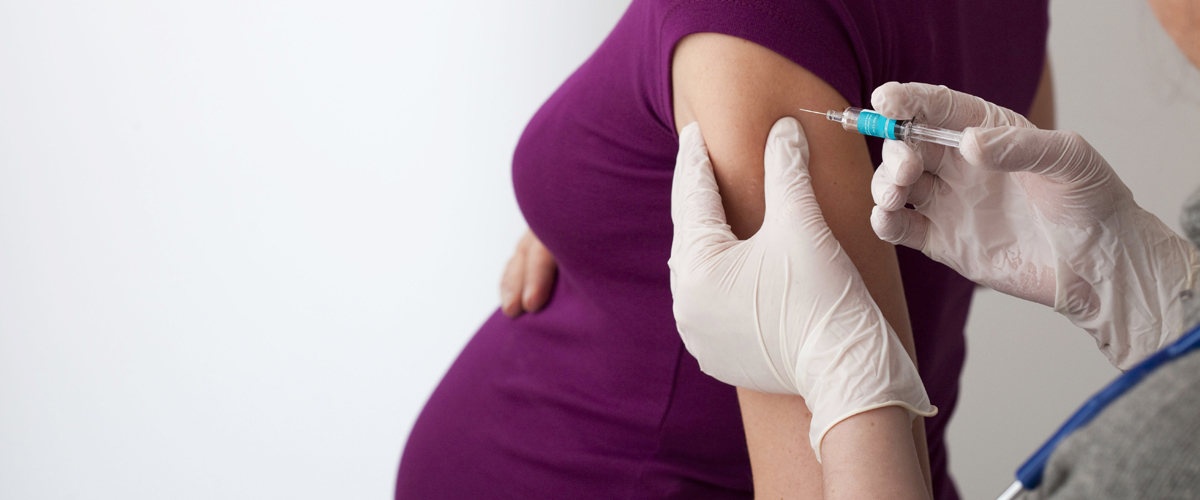Why Pregnant Women Should Get a Flu Shot
An OB-GYN chief and self-described “Flu Shot Queen” explains why the shot is so important for expectant moms.

The flu is hitting the United States early and hard this year, and the flu hospitalization rate is higher for this time in the flu season than it has been for more than a decade, according to the Centers for Disease Control and Prevention.
The flu shot reduces a pregnant person’s risk of being hospitalized with the flu by an average of 40%, and a new study reports that those who got a flu shot during pregnancy had a lower risk of stillbirth, preterm birth and low birthweight. Yet flu vaccine coverage among pregnant people has fallen in the last two seasons and is down so far this season as well, the CDC reports.
With cases on the rise, now is the time to get your flu shot if you are pregnant and haven’t received the vaccine this season, says Dr. Laura Riley, obstetrician and gynecologist-in-chief at NewYork-Presbyterian/Weill Cornell Medical Center and chair of the Department of Obstetrics and Gynecology at Weill Cornell Medicine.
“Moms-to-be tell me all the time they’re afraid the flu shot will hurt their unborn babies or they have never gotten the flu shot before so why now,” says Dr. Laura Riley, who has worked with the CDC and leading OB-GYN organizations to provide guidance on protecting pregnant women and their babies through vaccination. “I tell them that the flu shot has been evaluated in numerous studies and shown to be safe for babies. In fact, mom’s flu shot provides the best protection for newborns.”
Dr. Riley, a self-described “Flu Shot Queen,” spoke to Health Matters about pregnancy and the flu, and why getting the flu vaccine is so important for expectant mothers.
Why is it important for pregnant women to get the flu shot?
It is important to get the flu shot because pregnant women, if they get the flu, are at greater risk for having severe complications, including preterm labor, severe pneumonia that can lead to intensive care admission, even maternal death. The best prevention is the flu shot. Pregnant women should not get the nasal spray flu vaccine because it is made from live flu virus; they should get the inactivated flu shot.
Is the flu shot safe for the developing baby?
Not only is it safe for the baby, but the flu shot is protection, especially for babies that are born during flu season. When mom gets the flu shot, she develops antibodies to the flu that cross the placenta and protect the baby in the first several months of life before the baby can get a flu shot, which is not until 6 months old. Newborns have the highest risk of flu-related deaths among children, so you want to do all you can to prevent your baby from getting it. Flu vaccinations given to pregnant women reduce the risk of hospitalization from influenza by about 70% for infants younger than 6 months old.
Is the shot safe for the mom at any time during pregnancy and for breastfeeding moms?
It is safe for the pregnant mom during any trimester. Breastfeeding moms should also get the flu shot because women are at increased risk of severe illness from the flu up to about two weeks after giving birth. In fact, the recommendation is that everyone older than 6 months receive a flu shot to protect themselves and those around them.

Dr. Laura Riley
What should you do if you get the flu when pregnant?
If you get the flu even though you’ve gotten the flu shot, which we know some people will because it’s not 100% protective, it’s important to call your physician. The doctor will prescribe an antiviral medicine like Tamiflu to decrease the severity of your illness. The antiviral medicine is most effective if used as soon as you have the illness, so be sure to call right away. The flu symptoms to prompt a call include fever, cough, and body aches. If you are exposed to the flu while pregnant, it is important to call your doctor because Tamiflu is given to decrease the chances that you will get the flu.
When should pregnant women get the flu shot?
A pregnant woman can get it during any trimester, but it’s best to get it at the beginning of flu season, which is October. The flu season lasts through at least April, and that’s a long period of time that mom is at risk and baby is at risk. That’s why you want that prevention. In addition to the flu shot, which is the best prevention, it’s important to use good hand-washing, cough etiquette, stay home if you’re sick, and try not to make everybody else sick. Vaccinate your children every year — anybody over the age of 6 months should be vaccinated. Talk to your doctor if you have an allergy to ingredients in the vaccine.
Are there other vaccines pregnant women should get?
The other vaccine that’s really important is Tdap, which includes the protection against pertussis, or whooping cough. Although Tdap protects mom from getting pertussis, its greatest benefit is to protect the baby from dying of pertussis. Like the flu shot, the mom’s antibodies from the Tdap vaccine cross the placenta and protect the baby in the first two months of life before the baby can get their own Tdap vaccine. Nearly 70% of whooping cough deaths occur in babies less than 2 months old, and getting the Tdap vaccine lowers the risk of infants getting the illness by 78%. It’s important to get the Tdap early in the third trimester with every pregnancy. Pregnant people should stay up to date with their COVID-19 vaccines. Also, women who have other health conditions like diabetes and women who smoke should get the pneumococcal vaccine and should ask their doctor if they need other vaccines.
Laura Riley, M.D., is obstetrician and gynecologist-in-chief at NewYork-Presbyterian/Weill Cornell Medical Center and chair of the Department of Obstetrics and Gynecology at Weill Cornell Medicine. Dr. Riley is chair of the American College of Obstetricians and Gynecologists’ Immunization and Emerging Infections Expert Work Group and has served as a member of the Advisory Committee on Immunization Practice at the Centers for Disease Control and Prevention. She is the author of two books, You and Your Baby: Pregnancy and You and Your Baby: Healthy Eating During Pregnancy.
